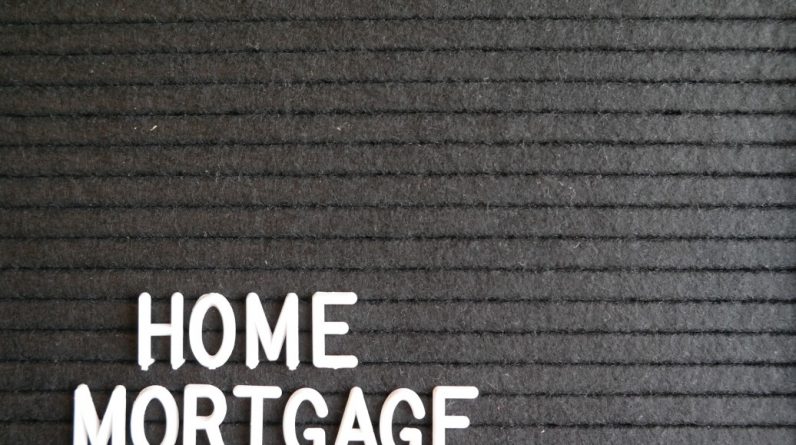
If you’re in the market for a mortgage loan, you may be wondering about the correct order for mortgage loan types. With so many options available, it can be challenging to determine which one is right for you. In this article, we’ll provide a brief overview of the different mortgage loan types and discuss the recommended order in which to explore them. By understanding the correct order for mortgage loan types, you’ll be better equipped to make an informed decision that suits your financial needs and goals. Let’s dive into the world of mortgage loans and explore the different types that are available to you. Whether you’re a first-time homebuyer, an investor, or looking to refinance your current property, there are various options to suit your needs. In this comprehensive article, we’ll guide you through the different types of mortgage loans, outlining their key features, benefits, and eligibility requirements. So, let’s get started!
Table of Contents
Conventional Loans
Conventional loans are the most common type of mortgage loans, typically offered by private lenders such as banks, credit unions, and mortgage companies. These loans are not insured or guaranteed by the government, making them ideal for borrowers who have good credit and a stable income. Conventional loans can be further categorized into fixed-rate and adjustable-rate mortgages (ARMs).
Fixed-rate Mortgage
A fixed-rate mortgage offers a consistent interest rate throughout the entire repayment period, providing certainty and predictability for homeowners. This means your monthly payment will remain the same, allowing you to budget effectively. Fixed-rate mortgages are available in various terms, typically ranging from 15 to 30 years, giving you the flexibility to choose a repayment term that suits your financial goals.
Adjustable-rate Mortgage
An adjustable-rate mortgage, also known as an ARM, offers an initial fixed-rate period, usually ranging from 3 to 10 years, after which the interest rate adjusts periodically. This means your monthly payment may fluctuate over time, depending on market conditions. ARMs often come with lower initial interest rates compared to fixed-rate mortgages, making them attractive to borrowers who plan to sell or refinance their homes before the adjustable period begins.
Government-backed Loans
Government-backed loans are designed to assist borrowers who may have difficulty qualifying for conventional loans. These loans are insured or guaranteed by government agencies, which mitigates the lender’s risk and allows for more favorable loan terms. The three main types of government-backed loans are FHA loans, VA loans, and USDA loans.
FHA Loans
FHA loans are insured by the Federal Housing Administration and are popular among first-time homebuyers. These loans offer more lenient credit requirements and lower down payment options, making homeownership more accessible. FHA loans also allow for higher debt-to-income ratios, meaning you can qualify for a larger loan amount even with existing debts.
VA Loans
VA loans are specifically designed for eligible veterans, active-duty service members, and their surviving spouses. These loans are backed by the Department of Veterans Affairs and offer several advantages, including no down payment requirement, competitive interest rates, and no private mortgage insurance (PMI). VA loans are a great option for those who have served in the military and are looking to purchase a home.
USDA Loans
USDA loans, also known as Rural Development loans, are insured by the U.S. Department of Agriculture and are intended for borrowers in rural and suburban areas. These loans offer 100% financing, meaning no down payment is required, and often come with low-interest rates. USDA loans provide an excellent opportunity for individuals and families with limited income to become homeowners in eligible areas.
Jumbo Loans
Jumbo loans are mortgages that exceed the conforming loan limits set by Fannie Mae and Freddie Mac, the government-sponsored enterprises that purchase most mortgages in the secondary market. These loans are often used to finance high-value properties or homes in expensive real estate markets. Jumbo loans can be further classified into super jumbo loans and high-balance mortgage loans.
Super Jumbo Loans
Super jumbo loans are for borrowers who need financing above the conventional loan limits. These loans are designed for luxury properties with exceptionally high purchase prices. Super jumbo loans come with specific eligibility criteria, higher credit score requirements, and may require a larger down payment.
High-balance Mortgage Loans
High-balance mortgage loans are a type of jumbo loan that falls within the conforming loan limits set by Fannie Mae and Freddie Mac, but still exceeds the standard loan limits for the area. These loans offer competitive interest rates and flexible terms, providing an option for borrowers who require higher loan amounts without venturing into the super jumbo loan territory.
First-time Homebuyer Programs
First-time homebuyer programs are tailored to help individuals who are purchasing their first home. These programs typically offer down payment assistance, reduced closing costs, and other incentives to make homeownership more affordable. The three main types of first-time homebuyer programs are FHA loans with down payment assistance, VA loans with down payment assistance, and USDA loans with down payment assistance.
FHA Loans with Down Payment Assistance
FHA loans with down payment assistance are designed to provide additional financial assistance to first-time homebuyers who may struggle to save for a down payment. These programs can be offered by state or local housing agencies and may come in the form of grants, second mortgages, or forgivable loans. By combining an FHA loan with down payment assistance, you can reduce the upfront cost of homeownership.
VA Loans with Down Payment Assistance
Similar to FHA loans, VA loans with down payment assistance programs aim to help first-time homebuyers by reducing the burden of a down payment. These programs are often provided by state or local housing agencies, nonprofits, or lenders themselves. By utilizing down payment assistance, eligible veterans and their families can take advantage of the benefits offered by VA loans without needing to save for a large down payment.
USDA Loans with Down Payment Assistance
USDA loans with down payment assistance programs are specifically designed for low-to-moderate income first-time homebuyers in rural areas. These programs offer financial assistance in the form of grants, loans, or forgivable second mortgages. By combining a USDA loan with down payment assistance, qualifying homebuyers can achieve homeownership more easily.
Investment Property Loans
Investment property loans are mortgages used to finance properties that are not intended as the borrower’s primary residence. Whether you’re investing in rental properties or looking to flip houses for profit, there are loan options available to suit your needs.
Fixed-rate Investment Property Loans
Fixed-rate investment property loans offer a consistent interest rate throughout the loan term, allowing investors to accurately forecast their monthly cash flow. These loans are commonly used for long-term investment properties, such as rental homes or multifamily units. With a fixed-rate investment property loan, you can secure a stable financing option for your real estate investments.
Adjustable-rate Investment Property Loans
Adjustable-rate investment property loans provide an initial fixed-rate period, followed by adjustable rates. These loans are suitable for investors who are planning to sell or refinance their properties within a few years. Adjustable-rate investment property loans often come with lower initial interest rates, making them an attractive option for short-term investors.
Home Equity Loans
Home equity loans allow homeowners to borrow against the equity they have built in their homes. These loans can be used for various purposes, such as home improvements, debt consolidation, or funding education expenses. Home equity loans can be further categorized into traditional home equity loans and home equity lines of credit (HELOCs).
Home Equity Loans
Traditional home equity loans provide a lump-sum payment to the borrower, which is repaid over a fixed term with a fixed interest rate. This type of loan is ideal for homeowners who have a specific purpose in mind, such as a major home renovation project or debt consolidation. With a traditional home equity loan, you can access a large amount of money upfront and budget for fixed monthly payments.
Home Equity Lines of Credit
Home equity lines of credit, or HELOCs, offer a revolving line of credit that homeowners can access as needed. HELOCs function similarly to a credit card, allowing you to borrow against your home equity up to a set credit limit. This flexibility can be advantageous for ongoing expenses, such as home improvements or unexpected financial needs. As you repay the borrowed amount, the available credit replenishes, providing you with an ongoing source of funds.

Reverse Mortgages
Reverse mortgages are unique loans available to homeowners who are 62 years or older and have significant home equity. These loans allow retirees to tap into their home equity without making monthly mortgage payments. Instead, the loan balance is repaid when the homeowner sells the property, moves out of the home, or passes away.
Home Equity Conversion Mortgages
Home Equity Conversion Mortgages (HECMs) are the most common type of reverse mortgage and are insured by the Federal Housing Administration. HECMs provide homeowners with various disbursement options, including lump sum, monthly payments, or line of credit. These loans offer financial flexibility for retirees and can be a useful tool for supplementing retirement income.
Proprietary Reverse Mortgages
Proprietary reverse mortgages are private loans offered by individual lenders. These loans are typically suitable for homeowners with high-value properties who have substantial home equity. Proprietary reverse mortgages may provide higher borrowing limits compared to HECMs, allowing homeowners with valuable homes to access a larger percentage of their home equity.
Specialized Loans
Specialized loans cater to specific needs and circumstances that may not fit into conventional loan categories. These loans provide financing options for energy-efficient homes, home renovations, and construction projects.
Energy Efficient Mortgage
An energy-efficient mortgage (EEM) is designed to encourage homeowners to make energy-efficient upgrades to their homes. These loans allow borrowers to finance the cost of energy-saving improvements, such as solar panels, insulation, or efficient HVAC systems. By incorporating these upgrades into the mortgage, homeowners can benefit from reduced energy costs and increased home value.
Renovation Mortgage
Renovation mortgages, also known as rehab or home improvement loans, provide financing for purchasing or refinancing a home in need of repairs or renovations. These loans allow borrowers to finance the purchase price of the property as well as the cost of renovations. Renovation mortgages are a popular option for homeowners who wish to customize their homes to their preferences or invest in properties in need of rehabilitation.
Construction Loan
Construction loans are used to finance the construction of new homes or major renovations on existing properties. These loans provide funds in stages, known as draw schedules, to cover the costs associated with the construction process. Construction loans are typically short-term loans, with interest-only payments during the construction phase. Once the construction is completed, the loan converts into a traditional mortgage.

Second or Vacation Home Loans
Second or vacation home loans are specifically designed for individuals who wish to purchase a second home for personal use or as a vacation retreat. These loans allow borrowers to finance a second property while maintaining their primary residence.
Fixed-rate Second Home Loans
Fixed-rate second home loans provide a consistent interest rate throughout the loan term, allowing borrowers to plan and budget for their second home expenses. These loans are suitable for individuals who want the stability of a fixed monthly payment and plan to keep their second home for an extended period.
Adjustable-rate Second Home Loans
Adjustable-rate second home loans offer an initial fixed-rate period, followed by adjustable rates. These loans are appealing to individuals who plan to sell or refinance their second home within a few years. Adjustable-rate second home loans may have lower initial interest rates, providing temporary cost savings for short-term vacation home buyers.
Bridge Loans
Bridge loans are temporary loans that bridge the gap between the purchase of a new home and the sale of an existing one. These loans provide homeowners with the necessary funds to make a down payment on a new property while waiting for their current home to sell.
Bridge Loans for Home Purchase
Bridge loans for home purchase are designed to help borrowers who want to buy a new home before selling their current one. These loans provide short-term funding, usually for a period of six months to a year, to cover the down payment on the new property. Once the current home is sold, the bridge loan is repaid in full.
Bridge Loans for Home Sale
Bridge loans for home sale are used by homeowners who need funds to cover expenses while waiting for their current home to sell. These loans can help cover mortgage payments, property taxes, and other costs associated with owning a home. Once the current home is sold, the bridge loan is repaid in full.
In conclusion, understanding the different types of mortgage loans is crucial when navigating the home financing process. Whether you’re a first-time homebuyer, an investor, or looking to tap into your home equity, there’s a loan option available to meet your specific needs. By exploring the various loan types outlined in this article, you can make an informed decision and secure the financing that best suits your goals and circumstances. Remember to consult with a mortgage professional to assess your eligibility and explore the loan options in more detail. Happy home financing!





